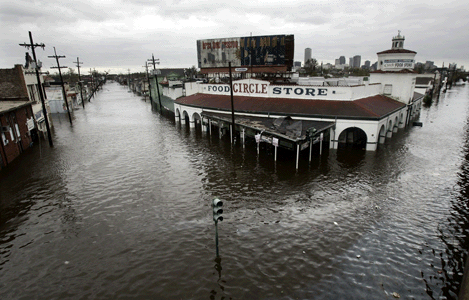Unprecedented Weather Extremes Reported
Wednesday, July 3rd, 2013July 3, 2013
Weather extremes unprecedented in records kept since 1850 pummeled Earth during the decade of 2001-2010, the World Meteorological Organization (WMO) reported today. The decade was the warmest for both hemispheres and for both land and ocean surface temperatures. The year 2010 was the warmest ever recorded, with an average temperature estimated at 1 Fahrenheit degree (0.54 Celsius degree) above the long-term average during the 1961-1990 base period. More national temperature records were reported broken than in any previous decade.
Extreme heat waves, particularly in Europe in 2003 and in Russia in 2010, caused a record number of deaths. The record high temperatures were accompanied by the rapid melting of Arctic sea ice, Antarctic ice sheets, and Greenland glacier ice. As a result, global mean sea levels rose during the 2001-2010 decade by 1/8 inch (3 millimeters) per year–about double the average rise of 1/16 inch (1.6 millimeters) during the 20th century.

Scientists believe that higher ocean temperatures are generating hurricanes of greater severity. (AP/Wide World)
The authors of the report analyzed trends, both global and regional, and such extreme events as Hurricane Katrina, floods in Pakistan, and droughts in the Amazon, Australia and East Africa. They noted that the decade of 2001-2010 was also the second wettest since 1901 and that 2010 was the wettest year ever recorded. They attribute the unprecedented weather extremes mainly to greenhouse gases generated by human action.
Additional World Book articles:
- Global warming
- Australia 2008 (a Back in Time article)
- Australia 2009 (a Back in Time article)
- Australia 2010 (a Back in Time article)
- Europe 2003 (a Back in Time article)
- Russia 2010 (a Back in Time article)
- Twisted–More Terrible Storms (a special report)



